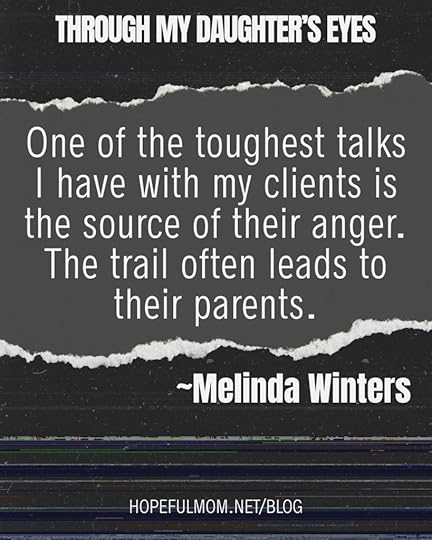Through My Daughter’s Eyes: Understanding the Anger of the Forgotten
I’ve never been more excited or proud to introduce a guest author at Hopeful Mom. My daughter Melinda Winters, a substance abuse counselor, is here to explain how pornography, neglect, abuse, and anger affect a child well into their adult years. Melinda is nurturing, patient, and loving. She treats everyone she meets with kindness and shows honor and respect to her clients. Every day, I’m impressed with her strength and resilience, even while she is tenderhearted toward those she interacts with. Melinda is passionate about helping women understand the importance of finding self-worth and valuing the person they can be. She has a powerful message for parents.
Walking into a room full of women filled with anger can often be challenging to navigate, especially when the room is inside a women’s correctional facility. Their faces and body language range from visibly angry and tense with arms crossed to masking their anger and pretending they are okay with a small smile and constantly moving hands. They avoid talking and making eye contact. Many of these women do not want to admit something traumatic happened to them. They do not want to admit they’ve been used and they have no self-worth. Or they repress memories of being used in their life. They want to be happy but instead find themselves constantly frustrated.
Anger: The Cause and EffectAs a substance abuse counselor, I walk alongside many women inmates with stories of hurt, anger, loss, and disappointment. We dig into their past and piece together certain moments, how they have impacted who they think they are, and how they were led to this moment. One of the toughest talks I have with my clients is the source of their anger. They could be angry about anything, but when we start walking the trail to find the source, it often leads to their parents. Much of their anger towards their parents is because of the way their parents took care of them. They did not realize until past their twenties that there was something wrong with how they were treated.
Many clients I interact with talk to me about their childhood. They open up about how their parents were addicted to pornography and how one parent, or both, sexually abused them all their life. They tell me stories of how uncomfortable they were in their own skin but never spoke up about it. For some clients, our conversations can be the first time they talk about their experience with pornography. A high majority of them were exposed to pornography at a young age because their parents watched it. It’s a trickle-down effect for the women. Each client has their own thoughts and feelings about their situation, but the most common emotion is anger. Anger towards her parents. Anger because she was ignored and used. Anger because she felt worthless. Anger because she could no longer be a child.

Some clients remember every detail of what happened to them. Others can’t recall because they repressed so much. Repression often results in anger. Anger towards the world and those around them. The reason people turn to anger is because it is the easiest emotion to exhibit. They lash out at those around them to avoid processing their emotions. Anger creates conflict within themselves and others. It is easy to get stuck in a cycle of anger creating more problems to hide the initial problem, their childhood hurt. These women run as fast as they can from these memories and avoid sitting and validating their own emotions. They turn to any substance use that will numb their pain and increase their anger.
Repressed memories of a parent's abuse often results in ongoing anger issues as an adult. Barb's daughter, Melinda Winters, shares how parents can prevent a future anger problem. Through My Daughter’s Eyes: Understanding the Anger of…
Share on X
At the end of many conversations, clients tell me they are exhausted from being angry. They do not want to continue being angry, but they do not know how to stop because of the cycle. A child’s life is affected by repetitive consequences they’ve received. Then they build their life and future on their emotional response to those consequences. I hear my clients say, “I never want my kid to go through what I went through” and “I wish my parents had just listened and helped me.”
It is often difficult to hear these stories and see the broken person sitting in front of me. All they ever wanted was a parent to pay attention to them. All they wanted was to be loved. All they wanted was help.
I encourage you to listen to your kids when they speak to you. Look them in the eye and actively listen to the words they tell you. They want to be heard. In addition, try to understand and find the warning signs in your children’s reactions and help them understand the importance of processing their emotions. Emotions are there for a good reason. They tell us when something is wrong and when something is good. However, at a young age, everything is thrown at them, and they don’t know what to do. Anger is the easiest emotion to turn to, but it also causes the most harm in relationships.
When we learn to process anger, face challenges, and resolve situations, we build healthy relationships and learn to face conflicts together, which leads to personal peace.
Subscribe to Hopeful Mom for two FREE PDF downloads, keep up with Hopeful Mom on Facebook, Instagram, and LinkedIn, and check out Barb’s book Sexpectations here.
The post Through My Daughter’s Eyes: Understanding the Anger of the Forgotten appeared first on HOPEFUL MOM.



